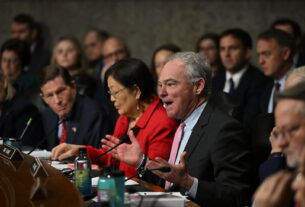The Biden administration unveiled a proposal on Wednesday to cut the level of nicotine in cigarettes, a last-minute push on a plan that could meaningfully cut cancer rates nationwide and extend the lives of millions of cigarette smokers.
If finalized, the proposal would require cigarette makers to significantly reduce the levels of nicotine in their products in an effort to make smoking less addictive and less satisfying. Research has suggested that the move would result in fewer people taking up the habit and would help the nation’s roughly 30 million smokers quit or switch to less harmful alternatives like e-cigarettes.
The policy is a centerpiece of antismoking initiatives by Dr. Robert Califf, commissioner of the Food and Drug Administration, who has recounted treating cardiology patients ravaged by smoking during his medical career.
“It’s the biggest thing I’ve ever seen in terms of societal benefit, cost saving and lives saved, and strokes prevented and cancers prevented,” Dr. Califf said.
The policy’s companion effort to ban menthol cigarettes has been set aside indefinitely after vehement opposition from cigarette makers and other opponents, including convenience store retailers.
Whether the nicotine reduction plan would survive the incoming administration of President-elect Donald J. Trump is unclear. Mr. Trump has traditionally been industry friendly and opposed to heavily regulating businesses. In addition, he has had the support of tobacco companies, including Reynolds American, which contributed at least $8 million to Mr. Trump’s main super PAC during the presidential campaign. Reynolds has already expressed its opposition to the proposed requirement.
Mr. Trump’s campaign co-chair and incoming chief of staff, Susie Wiles, is a former lobbyist for Swisher, a company that makes cigars. The rule applies to cigarettes, roll-your-own tobacco, pipe tobacco and cigars (though not premium cigars).
Some public health advocates are holding out hope that the Trump administration will allow the proposal to move forward, given that a previous version was considered by the F.D.A. during his first term. At minimum, officials could continue to allow the public to comment on the initiative without killing it or putting it into effect.
The F.D.A.’s proposal includes projections that by 2100, the nicotine reduction measure would prevent an estimated 48 million young people from starting to smoke. By 2060, the agency also estimates that 1.8 million tobacco-related deaths would be prevented, and that $30 trillion in benefits would accrue over 40 years, mostly from the generation that would not begin smoking.
“We do have an extremely toxic and addictive product with cigarettes that remain on the marketplace, that still kills almost a half a million people a year,” said Dorothy Hatsukami, a tobacco researcher from the University of Minnesota who has studied low-nicotine cigarettes for about 15 years. “So it’s really kind of an unfortunate situation that we haven’t really done anything dramatically about it.”
In 2022, Dr. Califf released an updated proposal to lower nicotine levels, and opposition began to grow almost immediately.
Tobacco companies have viewed the initiative as a major threat to their business. Luis Pinto, a spokesman for Reynolds American, said the proposal would “effectively eliminate legal cigarettes and fuel an already massive illicit nicotine market.”
“These actions would also have a significant negative economic impact on farmers, retailers and others,” he added.
Convenience store retailers have also opposed earlier versions of the proposal, saying they would sustain substantial losses in revenue from a projected decline in cigarette sales.
Congressional Republicans have also tried to thwart restrictions on nicotine levels. In 2023, members of an influential House subcommittee passed a measure that would have prevented the F.D.A. from spending any money to advance limits on nicotine, with nearly all of the supporting votes by Republicans. The Senate did not include the provision in a final budget package.
Still, supporters of the plan point to signs that incoming public health officials may be receptive to it, including to the popularity of Robert F. Kennedy Jr.’s pledge to tackle chronic diseases and improve the health of Americans if he is confirmed to lead the nation’s top health agency. Mr. Trump himself has said that he is personally opposed to cigarette smoking.
“Given these enormous benefits, we urge the incoming Trump administration to move forward in finalizing and implementing this rule,” Yolonda C. Richardson, the president of Campaign for Tobacco-Free Kids, said in a statement. “Few actions would do more to fight chronic diseases such as cancer and cardiovascular disease that greatly undermine health in the United States, and that the incoming administration has indicated should be a priority to address.”





